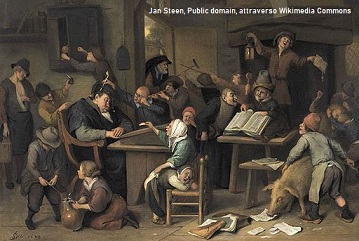“A Wikivoyage to…” Making the most of Emergency Remote Teaching for the development of transversal skills
DOI:
https://doi.org/10.54103/2035-7680/17886Parole chiave:
Cooperative writing; Emergency Remote Teaching; Tourism; Translation; Transversal skillsAbstract
In the context of a growing tendency towards teaching practices based on digital innovation, which the Covid-19 outbreak has further accelerated, experimenting with cooperative writing/translation projects based on Wiki technology has started to attract the attention of university scholars. A number of projects have thus emerged that exploit the Wikimedia ecosystem as a multilingual working environment for online authentic tasks, which are particularly appropriate for a new generation of “digital natives” who have been facing (forced) distant learning activities. Indeed, experience shows that the very myth of the digital natives’ fluency in the use of ICT is to be questioned, and the need for the development of ICT literacy and related transversal competences is strongly advocated. Against this background, the article reports on a project completed with distance learning-based activities at the University of Bari: “Transl/Editathon@Uniba. A Wikivoyage To Puglia”. The project had a twofold aim: it channelled resources with different expertise and knowledge backgrounds to offer a multi-disciplinary approach to tourism discourse, translation skills and IT competence; it aimed at raising awareness in students that a cooperation-based approach in a digital environment can enhance their transversal skills. The students’ ability in narrating their territory via Wikivoyage, and their feeling part of a virtual community, was the project’s added value in a time when distance(s) in geographical and interpersonal terms seem to have been loosening any sense of belonging.
Downloads
Riferimenti bibliografici
Benckendorff, Pierre, et al., editors. Tourism and Generation Y. Cabi, 2010.
Browning, Matthew H.E.M., et al. “Psychological impacts from COVID-19 among university students: Risk factors across seven states in the United States”. PLoS One. Jan 7;16(1)
Bruns, Axel. Blogs, Wikipedia, Second Life, and Beyond: From Production to Produsage (Digital Formations). Peter Lang, 2008.
Francesconi, Sabrina. Reading Tourism Texts. A Multimodal Analysis. Channel View, 2014.
Gatto, Maristella. “Wikipedia nella didattica della traduzione. Il caso di Translatathon@Uniba.” Wikipedia in Academia, edited by Corrado Petrucco, and Valentina Gallo. Padova UP, pp. 145-158, 2020
Gossling, Stefan, et al. “Pandemics, tourism and global change: a rapid assessment of Covid 19.” Journal Of Sustainable Tourism, no. 29, 2020, pp. 1-20, https//doi.org10.1080/09669582.2020.1758708. Accessed 05 Mar. 2022.
Hodges, Charles, et al. “The difference between emergency remote teaching and online learning.” Educase Review, 27 March 2020, https://er.educause.edu/articles/2020/3/thedifference-between-emergency-remote-teaching-and-online-learn. Accessed 07Jul. 2021.
Iglesias-Pradas, Santiago. “Emergency remote teaching and students’ academic performance in higher education during the COVID-19 pandemic: A case study.” Computers in Human Behavior, vol. 119, 2021, https://www.sciencedirect.com/science/article/pii/S0747563221000352. Accessed 05 Mar. 2022.
Jenkins, Henry. Convergence culture. Where Old and New Media Collide. New York University Press, 2006.
Karnik, Ajit, et al. “Examining the linkage between class attendance at university and academic performance in an International Branch Campus setting.” Research in Comparative & International Education, vol. 15, no. 4, 2020, pp. 371-390.
Kelly, Albert Victor. The Curriculum. Theory and Practice (Fifth Ed.). Sage, 2004.
Lockee, Barbara B. “Online education in the post-COVID era.” Nature Electronics, vol. 4, 2021, pp. 5-6
McDowell, Zachary J., and Matthew A. Vetter. Wikipedia and the Representation of Reality. Routledge, 2021
Misirli, Ozge, and Funda Ergulec. Emergency remote teaching during the COVID-19 pandemic. Education and Information Technology. Taylor and Francis, 2021.
Reagle, Joseph Michael. Good faith Collaboration: The Culture of Wikipedia. MIT Press, 2010.
Snart, Jason Allen. Hybrid Learning. The Perils and Promise of Blending Online and Face-to-Face Instruction in Higher Education. ABC-CLIO, 2010.
Šorgo, Andrej, et al. “Attributes of digital natives as predictors of information literacy in higher education: Digital natives and information literacy.” British Journal of Educational Technology, vol. 48 no. 3, 2016, pp. 749-767.
Suominen, Anu Helena, and Jari Jussila. “Sense of Virtual Community in Wikipedia Online Community for Technology-Enhanced Learning in Higher Education.” Research and Innovation Forum 2020 – Disruptive Technologies in Times of Change, edited by Anna Visvizi, et al., Springer, 2021, pp. 233-246.
Thomas, Michael. Deconstructing digital natives. Routledge, 2011.
Tkacz, Nathaniel. Wikipedia and the Politics of Openness. The University of Chicago Press, 2015.
Vosen Callens, Melissa. “Using Wikipedia to Teach Written Health Communication.” Engaging 21st Century Writers with Social Media, edited by Kendra N. Bryant, IGI Global, 2017, pp. 247-258.
Vygotsky, Lev Semënovič. Mind in society. The Development of Higher Psychological Processes. Harvad University Press, 1978.
Dowloads
Pubblicato
Come citare
Fascicolo
Sezione
Licenza

Questo articolo è soggetto a licenza Creative Commons Attribution-NonCommercial-NoDerivatives 3.0 International License.




